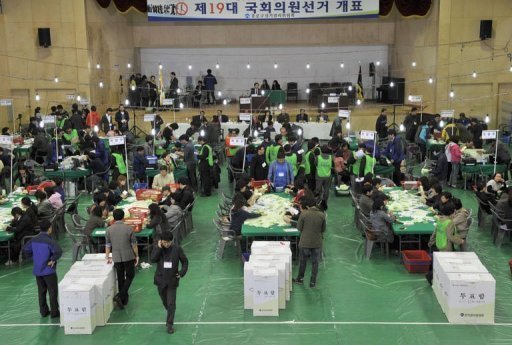South Korea’s ruling conservatives have won a parliamentary poll fought mostly on economic issues, with analysts saying voters opted for stability ahead of a presidential election in December.
Official results released in the early hours of Thursday showed the New Frontier Party (NFP) had won 152 seats in the 300-seat National Assembly, 25 more than the centre-left opposition Democratic United Party (DUP).
The DUP had been tipped to score an easy victory in earlier opinion polls but apparently threw away support by attacking an already-ratified free trade deal with the United States and the construction of a new naval base.
The ruling party, which had 165 seats in the outgoing parliament against 89 for the DUP, initially looked like it would struggle in its bid for re-election ahead of a campaign for a second successive presidential victory in December.
DUP’s top campaigner, Park Sun-Sook, said the party had failed to live up to voters’ expectations.
Political Science Professor Lee Jun-Han at Incheon University said the NFP had successfully campaigned on its slogan of “development amid stability”.
The leftist opposition Unified Progressive Party took 13 seats while five went to the right-wing Liberty Forward Party.
The result is expected to bolster the position of NFP leader Park Geun-Hye, a presidential hopeful. She has tried to rebuild the party since taking over in December last year.
The ruling party ditched its old name of the Grand National Party and moved to the left to try to shake off its image as a party for the rich. It pledged to improve state welfare programmes.
Turnout was 54.3 percent compared to 46.1 percent four years ago.
With economic concerns sidelining worries over North Korea, DUP tried to exploit discontent over rising prices, high education and housing costs, job difficulties, a widening income gap and a weak welfare system.
The ruling party succeeded in depicting its opponents as socially divisive and bent on undermining a decades-old security alliance with the United States, particularly through their vow to renegotiate the US free trade pact.
North Korea’s impending rocket launch is the focus of international attention but has barely figured in the election campaign in the South, which is used to tension with its communist neighbour.
Pyongyang, nevertheless, has repeatedly urged South Koreans to vote out the conservatives who scrapped a cross-border aid and engagement policy.
The parliament has 246 directly contested seats and 54 proportional representation seats, allocated according to the total number of votes parties receive nationwide.

COMMENTS
Please let us know if you're having issues with commenting.